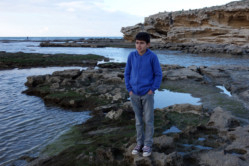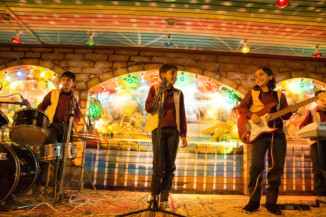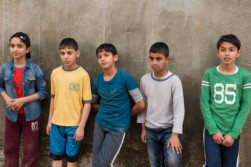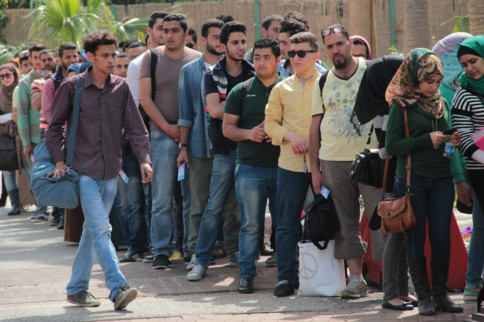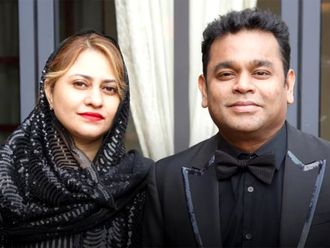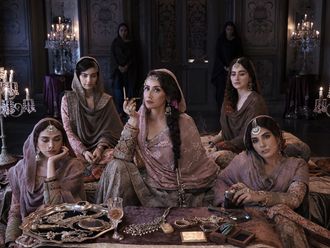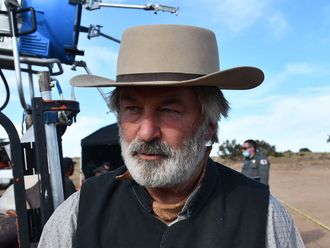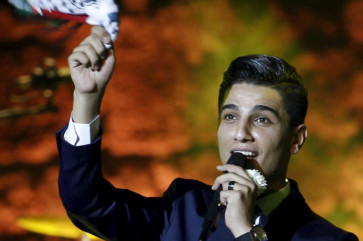
Even before he won the title, he’d already won the hearts of the people. And when he was crowned Arab Idol in 2013, Mohammad Assaf became a symbol of hope, zeal, determination, success and glory.
Assaf, who celebrated his 26th birthday on September 1, will be at the Toronto International Film Festival on Friday to watch a movie based on his life, a life that has completely changed in just six months.
“Yes, Insha’Allah, I am going to attend the screening,” Assaf told tabloid! before his trip to Canada this week. The film, called The Idol, (the Arabic title is Ya Teer Al Tayer, which means The Flying Bird), is directed by the Palestinian filmmaker from the 1948 Areas, Hany Abu-Assad, who won an Oscar nomination and a Best Foreign Film Golden Globe for his 2005 film Paradise Now. Abu-Assad’s 2013 film Omar was also nominated for an Oscar in the best foreign language film category.
“I shared really personal details,” Assaf said. “But the scenario of the movie was written in a dramatic way. Some of the events are imaginary and not real 100 per cent.”
Abu-Assad and Sameh Al Zubei share writing credits.
The film follows Assaf’s life growing up in the Gaza strip, one of the most populous and impoverished areas in the world, and his inspiring journey to and eventual win of Arab Idol. Part of the filming took place in Gaza, while the rest were in the west bank city of Jenin, Amman and the Dead Sea in Jordan.
“I would like both Arabic and Western audiences to watch the movie,” said Assaf. “For the Arabic audience, I would like to give hope to the youth that despite the difficulties, things can happen. The developments and difficulties in the Arab world have made the youth depressed. I was depressed, but I never lost hope and kept insisting on achieving my goal. A person can fail a million times, but he will succeed if he stays determined and has the talent and will to achieve his goal.”
For non-Arabic audiences, he said he would like them to start looking at Palestine, in general, and Gaza in particular with a different eye.
“It is not as people think; a place of war, destruction and terrorism. On the contrary, Palestinians, and the people of Gaza in particular, love to live, they have hopes, they produce and invent despite the difficult circumstances they are living in. They always think of how they can make their lives better in spite of their pain.”
Abu-Assad is optimistic Assaf’s story will strike a chord with a global audience.
“I have tried to make Assaf’s story universal by focusing on his relationship with his sister. The brother-sister relationship is universal and people from different parts of the globe will relate to it. In addition to Assaf’s story, this movie reflects the reality of Gaza and Palestine.”
The Dubai-based broadcaster MBC, which also owns the Arab Idol franchise, is one of the producers of the film.
Filming on location was a challenge, said Abu-Assad.
“Due to the Embargo on Gaza we were unable to shoot there so we had to bring kids from Gaza to be part of the movie. I insisted that the main kids should be from Assaf’s home town. We also faced issues in finding filming locations,” he said.
“What amazed me the most during the shooting was the acting of Gaza kids, though they never acted before they were excellent on set.”
After its premiere at Toronto, the movie will be shown at the London Film Festival in October.
“We are planning to participate in as many international festivals as possible. As for the Oscars, we will submit it for the 2017 edition since the movie was not ready by the 2016 edition submission dates,” said Abu-Assad.
Assaf, who also makes a short appearance in the film, says he hopes the movie will be shown in the West Bank and Gaza. He said he doesn’t known if it will have an impact on the lives of Palestinian refugees after 65 years of living in camps.
“You asked me a difficult question… you also need to ask the people,” he said with a deep sigh. “I present an artistic message, a message that people like more and find it easier to apprehend as opposed to a political stand,” he said.
“The whole world should be united against injustice.”
Assaf, who was also chosen as an ambassador for peace by the United Nations Relief and Works Agency for Palestine Refugees (UNRWA), is a top figure in the Arab world on social media, with nearly 7.2 million followers on Facebook and 1.3 million on Twitter.
His personal life was the subject of rumours recently when word began circulating that he’d gotten engaged to another singer.
“I pray to God that I find my partner,” he said with a laugh when asked if he has already found his love. “This is the only thing that has not worked out for me until now. I pray to God and I am optimistic. Once I find the woman I love, this will happen.”



